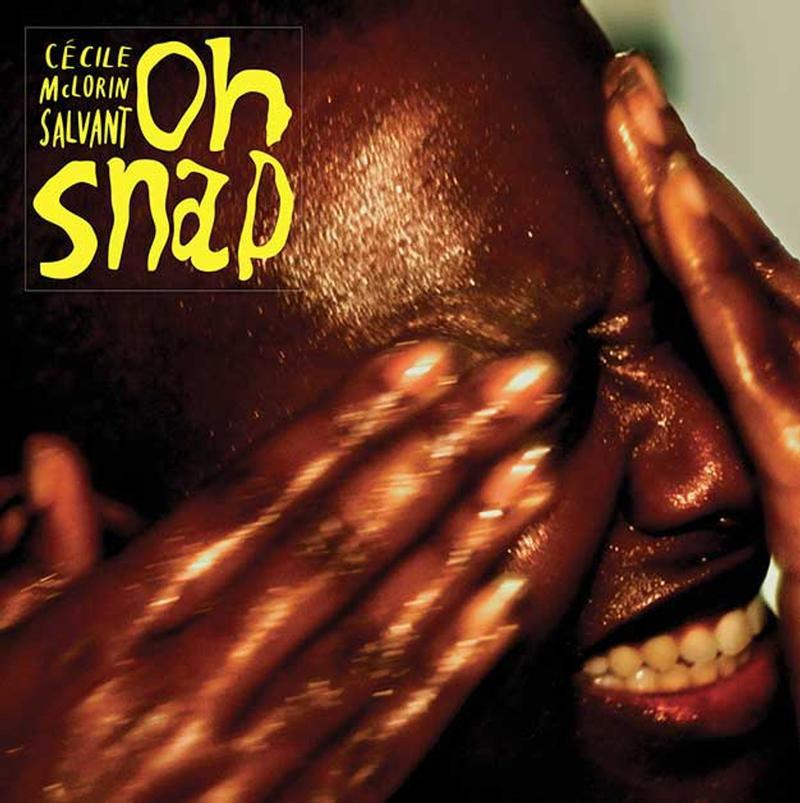Cécile McLorin Salvant's "Oh Snap" (!!)
Our greatest singer gets funky
Back in 2016, while interviewing her for a New Yorker profile, I asked Cécile McLorin Salvant, who was 28 years old and just emerging as the era’s greatest jazz singer, whether she might cover contemporary pop tunes. The question made her wince. “There are some new songs that I really like,” she replied, “but I never think, ‘Maybe I’ll sing this song.’ I don’t care whether what I do is modern or of our time. I want to sing songs that have this timeless quality… I love it when a song is 100 years old but still connects.”
Cut to nine years later, and Salvant’s latest album—her 7th on a commercial label, her 3rd for Nonesuch—is pure pop, some of it electro-funk. Even its title, Oh Snap, augurs something very “of our time”—very different from what she’s done before.
A couple of things are going on here. First, people change; in Salvant’s case, she was, to paraphrase Dylan, so much older then, she’s younger than that now. Second, her entire discography has reflected an evolving experimentation in styles and—especially since joining Nonesuch in 2022—in repertoire. In short, these days, she’s always doing something different from what she’s done before.
Her first three albums, on Mack Avenue, two of which won Grammy Awards (For One to Love and Dreams & Daggers) stuck to jazz standards, blues, and showtunes. Her next, Windows (another Grammy winner), crossed the line a little to caress Stevie Wonder’s “Visions.” Then, with her switch to Nonesuch, she swung the gates wide open. On Ghost Song, she covered not just Harold Arlen and Kurt Weill but Kate Bush, Gregory Porter, and Sting, as well as elevating her game as a composer. She based the songs for Mélusine on a 14th-century French folk tale and sang all but two of them in French (she had grown up in a bilingual household), thereby establishing that Nonesuch is letting her do whatever she wants. So why not follow that up with an album called Oh Snap, which features not just her acoustic jazz trio (pianist Sullivan Fortner, bassist Yasushi Nakamura, drummer Kyle Poole) but various synthesizers (some played by Salvant), drum machines, and such digital tools as GarageBand, Logic, AutoTune, and various Midi plugins? Oh, and, except for a 27-second cover of the trad tune “Brick House,” she also composed all of the album’s 13 tracks.
As for the results, I would say two things. First, if you’ve only recently heard about this spectacular singer and want to dip into her recorded works, I wouldn’t advise starting with this one. It doesn’t capture her versatility, virtuosity, or emotional and theatrical depth; that’s not the point of this venture. (For a more representative sampler, I would recommend Dreams & Daggers and Ghost Song.)
The second thing I would say about this album is that it’s a blast: adventurous, hugely fun, smartly witty, deeply personal (some songs are nakedly about how much she owes and cherishes her loved ones), and versatile in its own way. “Anything But Now” has a clever, almost Sondheimian twist. (She has been singing more and more Broadway tunes in concert, including a palpitating cover of Sondheim’s “Being Alive,” and I hope she records an album of his works sometime.) “Take This Stone,” with June McDoom and Kate Davis doing backup vocals, has a country vibe. “Second Guessing” and “Thank You” are lovely ballads. This, besides the aforementioned plunges into grunge and funk.
The tracks featuring her standard jazz trio were laid down by Andy Taub at Brooklyn Recording on that studio’s usual assortment of vintage mics and analog consoles. A few tracks (“Take This Stone,” “What Does Blue Mean to You,” “Expanse,” and “Anything But Now”) remain that way on the album, unadulterated, and sound quite a lot like the vocal-and-trio tunes on Salvant’s last few albums. For most of the other tracks, she added the synths and digital effects in her apartment, recorded by either herself or Jack DeBoe; the various layers were then all mixed by DeBoe, who has also engineered or mixed albums by Sullivan Fortner, John Batiste, and Lizz Wright, among many others. The album sounds very energetic, very clear—much more so than many other albums that lace in such digital strands—but, except for the few tracks recorded solely by Taub in the studio, don’t expect audiophile quality. That’s not what was intended here.
Where Cécile McLorin Salvant goes next—what vistas she’s eyeing, what skyways she’ll explore—no one can predict. If you have a chance to see her in concert (and she tours a lot), go. She usually covers a wide swath of her music’s waterfront, and, based on my experience, she keeps getting bolder, broader, deeper—in short, in so many ways, better. Meanwhile, I’m with Nonesuch: she can do whatever she wants.









































.png)








